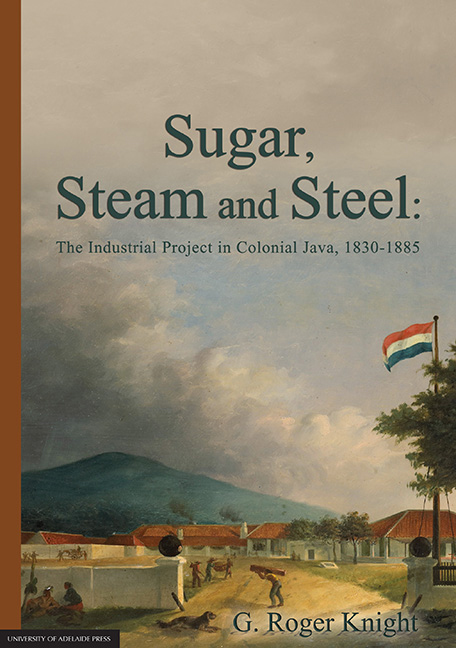Book contents
- Frontmatter
- Contents
- Abbreviations and Glossary
- Acknowledgements
- Introduction: Java Sugar, an Industrial Project and the ‘Oriental Cuba’, 1830-85
- Part I The ‘Industrial Revolution’ in Sugar Manufacture
- Part II The ‘Peasant’ Economy, the Money Trail and the Bourgeoisie
- Part III Metamorphosis
- Conclusion: The Future of an Industrial Project: The 1880s and Beyond
- Archival Sources
- Bibliography
Introduction: Java Sugar, an Industrial Project and the ‘Oriental Cuba’, 1830-85
Published online by Cambridge University Press: 24 October 2017
- Frontmatter
- Contents
- Abbreviations and Glossary
- Acknowledgements
- Introduction: Java Sugar, an Industrial Project and the ‘Oriental Cuba’, 1830-85
- Part I The ‘Industrial Revolution’ in Sugar Manufacture
- Part II The ‘Peasant’ Economy, the Money Trail and the Bourgeoisie
- Part III Metamorphosis
- Conclusion: The Future of an Industrial Project: The 1880s and Beyond
- Archival Sources
- Bibliography
Summary
This is a book about cane sugar and the transformation of an Indonesian island into the ‘Oriental Cuba’ during the middle decades of the nineteenth century. Between the 1830s and the 1880s, sweetener manufacture in Dutch-controlled Java — the crown jewel of the erstwhile Netherlands Indies — drew decisively away in matters of technology and sugar science from other Asian centres of production which had once equaled or, more often, surpassed it in terms of both output and know-how. Along with its larger and altogether more famous Caribbean counterpart, Java's industry came to occupy a position at the apex of the trade in what had become by this date a key global commodity. Along with the beet sugar producers of (post-1870) Imperial Germany, Cuba and Java accounted for a little over one-third of the world's recorded output of the industrially manufactured kind of sugar usually referred to as 'centrifugal'.
'Industrially manufactured’ is the key phrase here, since during the third quarter of the nineteenth century, it was these two island producers that became the prime centres of industrialised manufacture of cane sugar in their respective hemispheres. In neither case has this fact always been grasped. Cuba, along with the United States, was the nineteenth century's greatest holdout of slave-based commodity production, and the institution of slavery there outlasted its American counterpart for the better part of two decades, only coming to a (de facto) end in the 1880s. As a result, the industrial dimension of the Cuban ‘project’ in sugar has been obscured by notions — now largely exploded — that slavery and technological advance were incompatible.
In respect to Java, the focus of the present discussion, the parallel development of industrialised sugar manufacture has been obfuscated for reasons not dissimilar to those operating with regard to its Caribbean antipode. At least until recently, a parallel historiography charting a different kind of servility likewise had the effect of obscuring the industrial evolution of sugar. This occurred due to a near-exclusive concentration on the role played in the expansion of its production by commandeered inputs of land and labour under the aegis of the so-called Cultuurstelsel or System of [State] Cultivations.
- Type
- Chapter
- Information
- Sugar, Steam and SteelThe Industrial Project in Colonial Java, 1830-1885, pp. 1 - 8Publisher: The University of Adelaide PressPrint publication year: 2015



